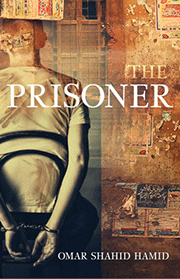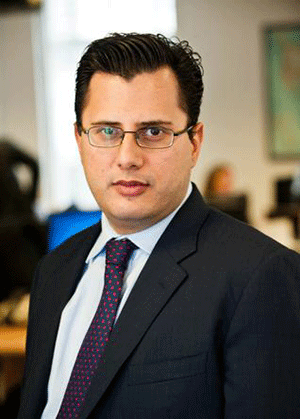The Prisoner: A Conversation with Omar Shahid Hamid
Omar Shahid Hamid on novelizing Karachi's cops and gangsters
With its exceptionally high murder count, enormous shadow economy, and baffling web of ties between criminals, police, politicians, and spies, Karachi would seem to be a natural setting for noir fiction. But Pakistani English literature hasn’t really done justice to the city’s underbelly, aside from a few romanticized coming-of-age-in-the-slum forays and Mohammad Hanif’s 2011 novel, Our Lady of Alice Bhatti, which offers it a few cameos in pungent, bleakly funny tones. No doubt this is because Karachi’s educated upper-middle class, which by and large produces its English literature, maintains its distance from the underworld. The extraordinary levels of violence in the city over the past two decades have led Karachiites to carefully and rigorously compartmentalize their physical and social space.
The recent publication of The Prisoner, the first novel by Omar Shahid Hamid, marks a new bridge between these two worlds. Hamid’s father, the director of the municipal electricity company, was assassinated while Hamid was in university, precipitating his entry into the police force. Over the past decade he has waded into some of the darkest corners of Karachi, battling gangsters and militants while juggling the demands of politicking bosses, powerful intelligence agencies, and endemic corruption in the ranks.
The novel, published by Pan Macmillian in India and available as an e-book on Amazon, offers an unvarnished look at those compromises and dilemmas. The book’s plot and characters exhibit a vivid and nuanced authenticity that rise above the pulp police-procedural style. Graft and extrajudicial ‘encounter’ killings are a casual part of the officers’ jobs, but so are acts of real, if reluctant, courage and self-sacrifice taken to protect the city against criminals and jihadists.
This authenticity of course arises from the fact that Hamid is writing what he knows. The novel’s plot blends several real-life events — notably the kidnapping and murder of Wall Street Journal reporter Daniel Pearl in 2002, the killing by police of Benazir Bhutto’s brother Murtaza in 1996, and the arrest of the hit man Ajmal Pahari in 2011 — and most of its characters have real-life analogues that will be detectable to aficionados of Karachi police history.
No character’s identity will be more obvious to them than the novel’s protagonist, Akbar Khan, a grizzled cop jailed for the shooting death of a politician who holds the key to rescuing a kidnapped American journalist. Khan is based on Chaudhry Aslam Khan, a larger-than-life officer known for his investigative mettle and (literally) take-no-prisoners style. Aslam has had plenty of detractors, who complain of corruption and extrajudicial killings, but also many supporters, who laud his public battle against the Taliban, which has been making alarming inroads on Karachi’s outskirts. For Hamid, Aslam represents the police force’s many shades of darkness and light — ones he ultimately came to embrace and inhabit himself. He credits his adoption of this approach to Aslam, because it was Aslam who arrested his father’s killer. It was a shock, then, when Aslam was assassinated in a bomb attack by militants this January 7, the day before the official launch of the book.
I spoke with Hamid — who has been in England on a sabbatical from the police force the past two years, but plans to return to active duty this summer — at the Karachi Literature Festival earlier this month.
MA: It must be an upsetting coincidence that Aslam was assassinated at the same time that the book has come out.
OSH: It’s just chance that I had come down for the book launch, I was actually supposed to leave the next day . . . I don’t know whether I’ve even processed it yet.
MA: How did this book come about?
OSH: I started writing it while I was in England, as a sort of catharsis. Then it took on a life of its own.
MA: What I find extraordinary about the novel is how well it renders a very particular milieu, that of the police and criminals, in all its brutality and humor.
OSH: I always enjoyed The Godfather because it created this world, the Sicilian mafia, that no one [in Pakistan] had heard of at the time. The bit that I found enjoyable about writing was creating this world that the reader is dropped into.
MA: I’ve always been struck by how many universes Karachi contains, and how little people actually know about the lives the police live in this city, how violent and complex they are. Sometimes I think that, in a certain sense, the police are closer to the criminals they’re chasing, because they live in the same world, than they are to the citizens they protect.
OSH: It’s a bit strange because you have one foot in this world and the other in that one.
MA: Another thing I find remarkable is the unabashed portrayal of police corruption.
OSH: It’s part of the way that the police functions. It always has been and probably always will be.
MA: It’s very morally ambiguous, isn’t it? I mean for you it must have been quite a change — you come from an elite, upper-class background, your father was this very upright businessman and civil servant, and now you have to adapt to a world where things are much more complex.
OSH: I’ve never been personally corrupt. But I know that in various commands, my subordinates were engaged in it. If it went too far, then I had to intervene, but it was also how the system functioned, you couldn’t completely halt it without everything breaking down.
MA: It’s partly about adapting to a whole ecosystem of power, no?
OSH: Yes. Cops aren’t necessarily putting payoffs into their own pockets. Sometimes you have to pay your superiors, and you need money to pay informants.
MA: Aslam came from a very different socioeconomic background from you, like most of the police.
OSH: I don’t partake in it because I can afford not to. But there were others who came from similar backgrounds to me who just enriched themselves.
MA: And in fact, there’s something quite sympathetic about your portrayal of the Karachi police.
OSH: This is the police, warts and all. It’s only when you show this complete picture that you can understand that these are ordinary people doing extraordinary things. If I had toned it down, it wouldn’t have done them justice.
 MA: What kind of reaction have you gotten from your colleagues?
MA: What kind of reaction have you gotten from your colleagues?
OSH: I keep joking that cops don’t really read books. Aslam was quite happy that someone had written about all this.
MA: Did you get the sense that Aslam saw what was coming? He was so publicly defiant it was almost like he was tempting fate.
OSH: After the blast [that targeted his home in 2011], Aslam had renewed gusto. He came out and said “Fuck the Taliban, I’m going to make an example of you for generations.” Positions on both sides hardened. Their rating for him as a target was as high as the army chief’s.
MA: And so there was no way out for him anymore?
OSH: Aslam couldn’t be posted anywhere else, this was the only thing that he could do. It’s very difficult to disengage. Nothing we have ever done has prepared us for this kind of shit. It’s a war.
Matthieu Aikins is working on a feature about the gangs of Karachi for Harper’s Magazine. His research in Pakistan has been funded in part by the Pulitzer Center for Crisis Reporting.



